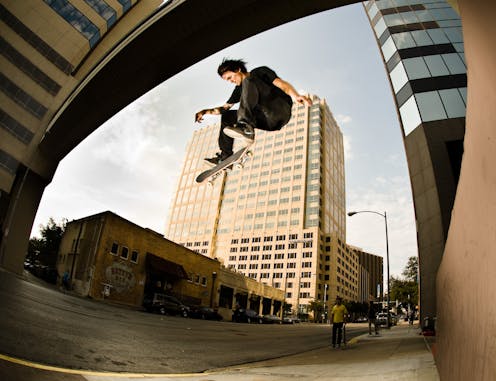Skateboarding defies the neoliberal logic of the city by making it a playground for all

Skateboarding today is a global phenomenon, with around 50m riders and thousands of skate parks worldwide – it will even feature as a sport in the 2020 Olympic Games. From the full on testosterone of Thrasher skateboard magazine to the fashionable styling of Vogue, the skater girls and boys of Kabul to the Native American reservations of South Dakota, the skate parks of Brazil to the streets of Shenzhen, skateboarding is no longer just for punkish, subcultural rebels – it’s everywhere, for everyone.
Along the way, skateboarders have achieved great things in art, film, photography and DIY skate park construction, and have engaged with important matters of gender, community and professionalism, plus commerce, heritage and social enterprise.
This may come as something of a surprise to those who are mainly familiar with the stereotype of skateboarders as white teenage boys. In fact, a skater today might well be Asian and hipster cool, black and entrepreneurial, female and physically challenged, older and gay – or any other variation imaginable.
Alongside gritty urban streets, new skate terrains have emerged, from DIY constructions, flow bowls and street plazas to longboard parks, multistory wonderlands and hybrid public spaces. Skateboarding’s influence even extends to preservation, heritage, planning and urban politics.
Entering a skate shop, you are as likely to see branded shoes and t-shirts as actual skateboards. Inevitably, big companies are also involved, including the likes of Adidas, Levi’s, New Balance, Nike and Vans.
Many university academics are even now researching skateboarding, from the perspectives of sociology, gender, sexuality, sports professionalism, graphic design, architecture, politics and urbanism. Personally, I’ve been actively researching skateboarding since 1988, culminating in my new book Skateboarding and the City: a Complete History, as well as being an active skateboarder since 1977.
Play over productivity
Most profound of all is skateboarding’s contribution to city streets and public spaces, for it remains, at heart, an urban activity. While cities are made up of housing, offices, banks, transport, universities and so forth, skateboarding makes use of these buildings without engaging with their productive activities. Freed from the strictures of regimented skate parks and the demands of organised sport, street skateboarders implicitly deny that cities should always be productive or useful.
The kind of skateboarding that rides up the walls of banks, slides down handrails and grinds across plaza ledges, disrupts the economic and functional logic of cities. Instead, skateboarding correlates with Pat Kane’s contention that our dominant work ethic should be accompanied by an equivalent “play ethic”, where play is not just personally pleasurable but also collaborative, creative and politicised.
Here, skateboarding suggests that our lives and cities should be full of mobility, pleasure and joy – and not just of sedentary labour and earnest endeavour. The result is, or should be, a city not of passive shopping malls but of vibrant bodily life.
This, perhaps, is the most overtly political space created by skateboarders: a pleasure ground carved out of the city, as a continuous reaffirmation of one of the central slogans of the 1968 strikes and student protests in Paris: that “sous les pavés, la plage” (beneath the pavement, lies the beach).
Overcoming obstacles
Today, skateboarding in public spaces is legislated against everywhere from Brisbane and Manchester to Quebec and the Bronx. This accords with a common social fear of teenagers in general, with skaters as young adults being regularly viewed as potential muggers, robbers or worse. As US president George H.W. Bush once said of skateboarders: “Just thank God they don’t have guns” (quoted in Thrasher, March 1992, p.74).
Physical barriers are also put in place to discourage skateboarding. As the homeless are routinely excluded by “defensive architecture” such as odd-shaped benches, spikes on window ledges and sprinklers above doorways, so skaters encounter rough textured surfaces, “skatestopper” blocks, chains and scatterings of gravel, deliberately intended to ruin their run.
Yet skateboarding can be an ideal training ground for entrepreneurs and other model citizens. Skateboarders are constantly learning and inventing new tricks, which demands innovation, risk taking and an ability to learn through failure. Their typical distrust of organisations, teams and routines means they are independent minded, with a sense of personal responsibility.
Skateboarding has provided an experimental space for the likes of video artist Shaun Gladwell, film maker Spike Jonze and photographer Fred Mortagne to hone their creativity (you can find more examples here).
It can also promote community values: the Pushing Boarders events (London 2018 and Malmö 2019) are exploring diversity among skateboarders. As African American skater Karl Watson put it: “The skateboarding community embraces all ways of life, whether you are black or white, old or young – it embraces all people.”
Read more: How skateboarding flipped its white male image and welcomed the whole world
More positive attitudes towards skateboarding are beginning to emerge, as people become aware of its economic and cultural benefits, and mindful of the need to encourage healthy physical activity among city dwellers of all ages. In cities such as Malmö, London, Brisbane, Rapids City, Coventry and Hull, public recognition for skateboarders has undoubtedly increased in the form of support for skate parks, skateable public spaces, skate-focused schools and city policy.
It seems as though skateboarding is finally being seen in its true light: critical, rebellious, non-conformist – and a dynamic presence in cities around the world.
Iain Borden does not work for, consult, own shares in or receive funding from any company or organisation that would benefit from this article, and has disclosed no relevant affiliations beyond their academic appointment.

